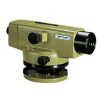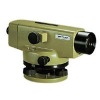- Contact Person : Mr. Ren Shuangcai
- Company Name : Beijing Gelinruida Technology Development Co., Ltd.
- Tel : 86-010-52258115
- Fax : 86-010-52258116
- Address : Beijing,Beijing,13L,Tower A, Jianan Mansion, No.2, Youanmen Outer Street, Fengtai District, Beijing, P.R. China.
- Country/Region : China
- Zip : 100069
automatic level
Technical Data | NA2 / NAK2 |
Accuracy* | 0.7 mm (dependent on staff, technique)0.3 mm (with parallel-plate micrometer) |
Magnification | standard: 32xFOK73 eyepiece (optional): 40x |
Shortest focusing distance | 1.6 m |
Compensator setting accuracy | 0.3'' |
The NA2 universal automatic level meets all requirements regarding precision, convenience and reliability.
It was designed by survey orsand development engineers with years of experience and who know what a field instrument has to be able to do.
The NA2 soon pays for itself, because it can be used for all types of surveying job; on building sites for routine levelling,
in engineering projects, and for geodetic control at all levels of accuracy.
Universal application
• Levelling of all types and all orders of accuracy
• Precise levelling and settlement determinations on buildings
• Routine heighting for the construction of roads, railways, pipelines, tunnels and so forth
• Setting-out work and control measurements on
the construction site
• Area levelling of high
accuracy
• Tacheometric levelling
with the K-version on flat
terrain by combining
stadia and angular measurements
with height
readings
• Deformation measurement
and monitoring of
bridges
Quickly set up, simple to use
Strong tripods
In principle, the NA2
can be set up on any Leica
Geosystems tripod. In
practice, for all-round
purposes, we recommend
the heavy-duty GST20
telescopic-leg tripod.
For precise levelling the
GST40 fixed-leg tripod
is suitable because of its
extreme rigidity.
The modular relationship
between instrument and
tripod is an advantage
when transport space is
limited.
Centring is easy
The circular level only
needs to be centred
approximately to bring the
compensator well into its
working range of ~30', and
so setting-up goes quicker.
The bubble is viewed
positively via a pentaprism
and is monitored down
the eyepiece.
Play-free footscrews
The pitch of the smoothrunning
and backlash-free
footscrews is such that
the bubble can be centred
in a very short time.
Independent of
temperature
Unlike the tubular level of
a traditional instrument, the
NA2 universal automatic
level is relatively insensitive
to direct solar radiation
and an umbrella need only
be considered for the most
precise levelling.
Adjust the line of sight automatically
Easy to level up
The advantage of this
instrument is that, as soon
as the bubble is centred,
the line of sight is horizontal
for all pointings of the
telescope. The observer is
freed of the time-consuming
centring procedure involved
with the traditional tubular
level, and can concentrate
on the business of staff
readings.
Minimum maintenance
In the unlikely event that
the compensator is
damaged (and this can only
happen as a result of
extremely harsh treatment)
it is replaced easily, being
held only by three screws.
NA2/NAK2 compensator
1 Suspension tapes
2 Prism (fixed)
3 Compensator body
4 Pendulum with prism
5 Line of sight
6 Push-button
7 Spring which taps pendulum
8 Pneumatic damping mechanism
Push-button control –
added security
With most automatics one
taps the tripod or instrument
to check if the compensator
is functioning.
Leica Geosystems offers a
far more sophisticated
solution.
Pressing the button under
the NA2 eyepiece gives the
compensator a gentle tap,
so that you see the staff
image swing smoothly
away and then float gently
back to give the horizontal
line of sight. This check,
which takes less than
a second, is technically
perfect, as the pendulum
itself is activated and
swings through its full
range. It is also immediately
apparent if the bubble
is not centred.
Robust and automatic
The compensator is
essentially a pendulum
with a prism (4).
The suspension system
comprises four flexed
tapes (1) made of a special
alloy to ensure faultless
functioning even at extreme
temperatures. The compensator,
which is located
between the focusing lens
and the crosshair reticle,
is pneumatically damped
against mechanical vibration
and is screened against
magnetic fields.
automatic level






